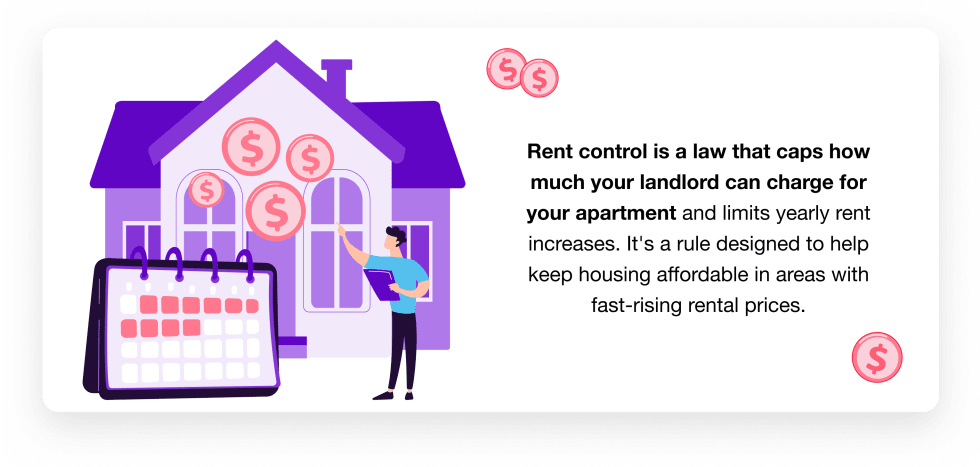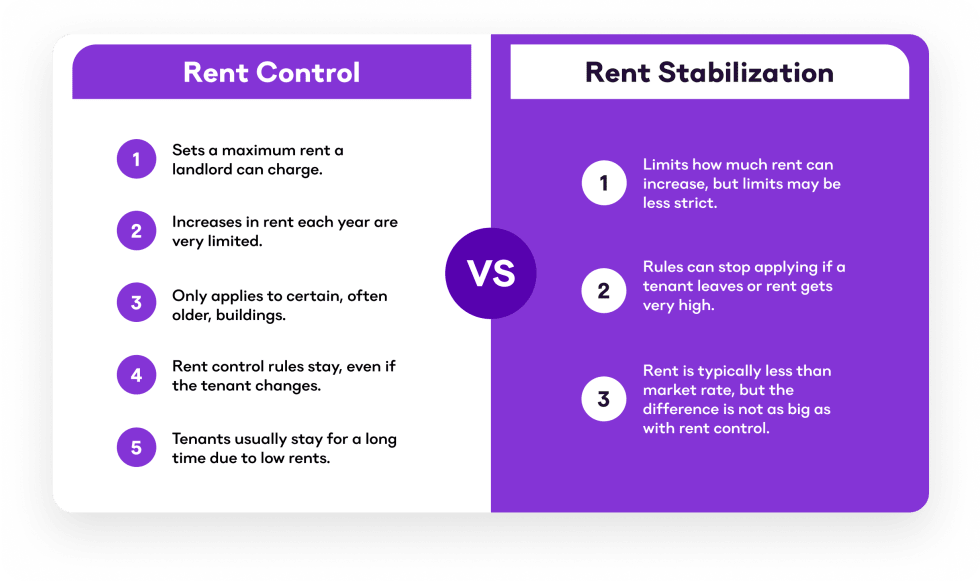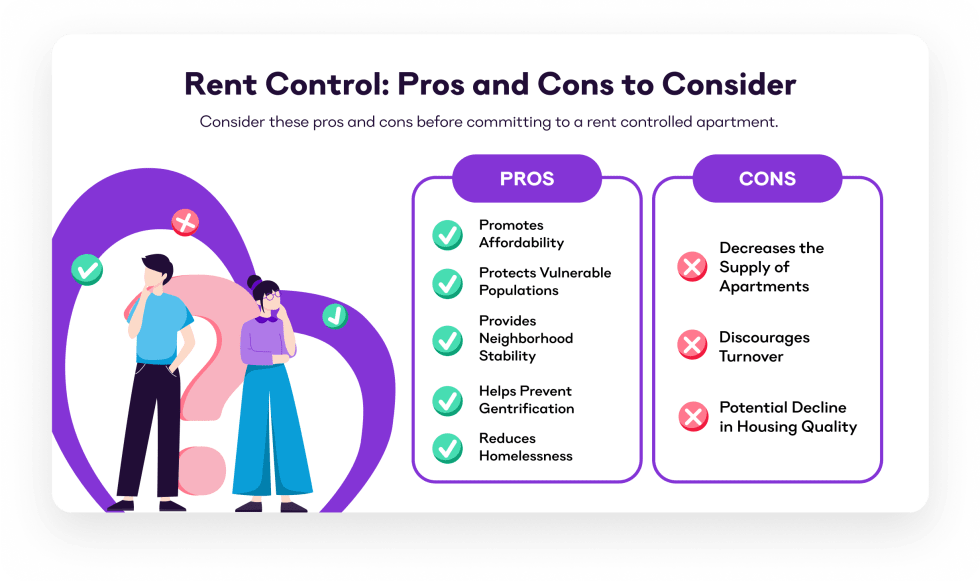Rent Control: What Is It + How Does it Work

Many renters dream of scoring stable, predictable rent, especially in expensive areas like New York City. Beyond limiting how much landlords can charge, rent control sometimes stipulates when a lease agreement can be terminated or a tenant can be evicted. Rent control laws vary widely by region but are generally in place to keep living costs affordable for lower-income tenants.
These laws are pretty complex, but it's worth looking into and potentially finding a cheaper rent on your next apartment. We put together everything you need to navigate it yourself. Here's how to get started.
What Is Rent Control?

Rent control is a government policy that limits how much landlords can increase rent, aiming to keep housing affordable for tenants. However, there are exceptions and expirations on it, including after a tenant vacates the unit. Despite the relief that rent control offers, it's not commonplace in the U.S. Cities with rent control include New York, New Jersey, California, Washington, D.C., and some parts of Maryland.
However, Oregon and California became the first rent control states to restrict annual rent increases to specific percentages. Right now, it's up to 10% for California and 14.6% in Oregon, although the landlords also follow a Consumer Pricing Index to come up with a percentage, which means it could be less than you expect. Elderly and disabled renters are also charged a smaller increase.
How Does Rent Control Work?
Every area works differently, but in New York City, tenants must have lived in the building continuously since July 1, 1971, in a building constructed before 1947. However, the leaseholder can pass down the unit to their children if they also lived in the rent-controlled apartment for at least two consecutive years. But when a tenant moves out and their child doesn't request what’s known as “succession rights,” their rent-controlled apartment can be removed from rent regulations altogether, and a landlord can charge market value.
In Washington, D.C., the rent control law stems from the Rental Housing Act of 1985 and is an annual adjustment. It's based on the Consumer Price Index (CPI-W) increase, which is usually about 2%, but cannot rise more than 10%. In California, the cap is 10%; Oregon’s limit is 14.6%; and New Jersey’s is 2% to 6% per year. These figures can change, so it's always a good idea to verify the stats if you're looking for a rent-controlled apartment.
Properties Exempt From Rent Control
There are exceptions to rent control depending on which state or municipality you live in. These exceptions include:
- Newly constructed buildings
- Owner-occupied buildings that have no more than four units
- Single-family homes
- Condos
- Townhouses
- Luxury apartments
Any rent control ordinance is complex, and you may find some slight variations in your apartment search. For example, D.C. rent control laws dictate that a "small landlord" is when someone owns four units or fewer. If you live in California, single-family, owner-occupied residences where the owner rents no more than two bedrooms or units are exempt. Those rentals could also include an accessory dwelling unit (ADU).
Rent Stabilized vs. Rent Controlled

The terms "rent controlled" vs. "rent stabilized" are often used interchangeably, but they're actually two different things in New York City. “Rent-controlled” units are part of a government program in New York that limits how much a landlord can charge for an apartment or lease renewal. In other states, rent control is basically the same thing as what New York calls rent stabilization — a percentage limit to how much a landlord can raise rent.
There's more to these rent control policies in New York City. The 1970s rent control program prohibits rent increases for one or two years in buildings of six or more units built between February 1, 1947, and December 31, 1973.
The city mayor also appoints a Rent Guidelines Board to set the allowable percentage of how much rent can go up. However, rent in most rent-controlled apartments can only rise up to 3.25% to 5% depending on the length of the lease but cannot exceed a maximum base rent determined per unit.
Pros and Cons of Rent Control

But who benefits from rent control? Despite how controversial rent control and rent stabilization are, they’re desirable to any budget-conscious renter. Here are some of the rent control pros and cons of scoring these apartments.
Pros: Promotes Affordability
The goal of rent control is to enable people to pursue careers in expensive cities who would otherwise have trouble finding affordable housing. Rent control can also help people open businesses and live in the communities they serve.
Pros: Protects Vulnerable Populations
Rent control enables moderate- to lower-income families and individuals on fixed
incomes to live reasonably well without fearing a massive rent hike that forces them out. People who are elderly or disabled don't have to worry about a catastrophic rent increase with nowhere to go.
Pros: Provides Neighborhood Stability
Benefits of rent control include making neighborhoods safer by fostering a sense of community with long-term renters and lower turnover. With less turnover, renters are more likely to get to know their neighbors and get socially involved.
Pros: Helps Prevent Gentrification
Gentrification is a problem in almost every major city and happens when a characteristically poor or inexpensive urban area is changed by wealthier people moving in from housing to business. The results displace longtime residents, who are forced to move on after a rent hike that reflects the changes in the neighborhood. The pros of rent control mean less turnover and better chances for lower-income residents to stay put.
Pros: Reduces Homelessness
Rent control can be a lifeline in cities with a dramatic increase in people experiencing homelessness. Instead of facing rent increases that someone can't afford and being forced onto the streets, stable rent keeps them in their homes.
Cons: Decreases the Supply of Apartments
Rent control rules are super complex and only cover some apartments. As a result, you see a decrease in inventory in the units you qualify for and can actually apply for. After all, not many people move out of rent-controlled apartments willingly. In some areas, rent control and stabilization laws deter developers from building more units, as they won't recoup as much profit from them.
Cons: Reduces Housing Quality
It's common to hear stories about rent-controlled and stabilized apartments in lousy shape and in need of desperate repairs. Whether landlords don't want to deal with their rent-controlled units or feel it's too expensive to fix them, the quality of existing rentals can plummet.
Cons: Discourages Turnover
Rent-controlled apartments turn over at a snail's pace and often leave renters with mismatched needs. For example, a family could continue living in a rent-controlled studio apartment to hold on to their deal. Or an older couple whose children have grown up and moved away may live in a family-sized unit and be afraid to downsize and lose their rent control.
As a result, there needs to be more available inventory in the market suitable for apartment hunters.
Make Your Move: Start Apartment Hunting
Now that you know what rent control is, there's no way around it: Rent control and rent stabilization laws are complex and have their share of drawbacks, but they're still highly sought-after by renters. You can look for your own rent-controlled apartment, but you'll need to stay diligent and exercise persistence to find one and hold on to it. It's also vital to check the latest figures and stats, as rent-control and rent-stabilization rules can quickly change.
Ready to find an apartment that fits your budget? Sign up for Apartment List to find the ideal place for you. With us, you’ll spend 5 minutes and save 50 hours searching.
Frequently Asked Questions
How Can I Find Rent-Controlled Apartments?
In California and Oregon, most newer multifamily units are rent stabilized.
You can try sites like AmIRentStabilized.com to find info, although not all cities keep their public government listings up to date. Asking around by word-of-mouth or filling out an online inquiry with New York State here will yield better results.
Who Is In Charge of Rent Control Rules?
If you live in Oregon or California, either local municipalities or the state government determines rent control rules. In New York, the city mayor appoints a Rent Guidelines Board to set the rent policy and how much rent can rise.
What Is the Most a Landlord Can Raise Rent?
The amount a landlord can raise rent depends on where you live and whether the building is rent-controlled or rent-stabilized. In most states, there is no limit to how much a landlord can raise the rent.
However, in states with rent control like Oregon, the new cap is 14.6%. In California, it's 10%; in New York City it is 3.25% to 5%; and in most parts of New Jersey, it’s 2% to 6%. There are some universal exceptions if you're a disabled or elderly renter.
Share this Article




